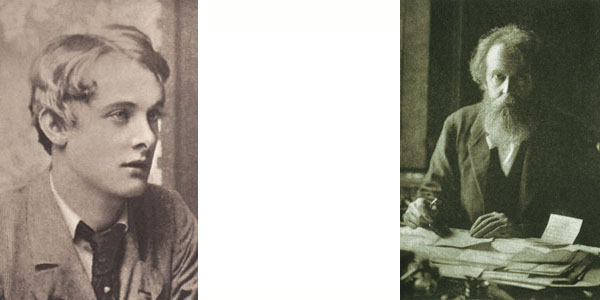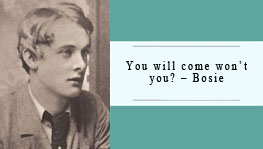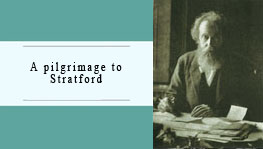
left: Lord Alfred Douglas, photographed in Egypt early in 1894. Later the same year he stayed three times with Oscar Wilde in Worthing
right: Wilfrid Scawen Blunt, who took Lord Alfred Douglas on a ‘pilgrimage to Stratford-upon-Avon at the start of August 1894.’
Chapter 4: 'You will come, won’t you?’ – Bosie
The fourth chapter focuses on Bosie’s visits to Worthing during Wilde’s stay. Careful analysis of the limited evidence available indicates that Bosie paid three visits in all, and makes it possible to determine to within a day or two what the dates of those visits were.
Bosie and Wilde regularly went out on a sailing-boat with three local teenage boys. One of these, Percy, was his particular favourite, although there is no evidence that Bosie seduced him.
On his third visit to Worthing, however, Bosie arrived with a ‘companion’ whose age and social class left Wilde with no option but to decline to let Bosie and the boy stay at his house – not least because Wilde had already started entertaining sixteen-year-old Alphonse Conway there.
The extract below is the section that begins the chapter, and focuses on Bosie’s trip to Stratford-upon-Avon in early August 1894 with his distant cousin Wilfrid Scawen Blunt, which has not previously received any attention. This section also identifies that the notorious postcard on which Bosie threated to shoot his father was written during a period of 24 hours or so that Bosie spent in London between his return from Stratford and his going down to Worthing for the first time.
Lord Alfred Douglas visited Worthing three times during the summer of 1894. We know this because, in reference to Bosie’s final visit, Wilde writes in ‘De Profundis’: ‘the two [other] visits you had paid to me had ended’.[1]
Information from the diaries and letters of Wilfrid Scawen Blunt and from the two longest surviving letters that Oscar wrote to Bosie from Worthing – together with some material from elsewhere and a little informed conjecture – allow us to piece together the dates of Bosie’s three stays in Worthing.[2]
The day before Oscar left London for Worthing – thus, almost certainly on 9 August [3]– Oscar wrote to Bosie strongly urging him to join him in the town:
I go down to Worthing tomorrow … When you come to Worthing, of course all things will be done for your honour and joy, but I fear you may find the meals, etc., tedious. But you will come, won’t you? at any rate for a short time – till you are bored.
As soon as Wilde arrived in Sussex he wrote in haste to contradict his earlier suggestion.[4]
The reason for the change of heart was that when he got to Worthing he was exposed to the full horror of a conventional family seaside holiday – not only were his own children ‘tedious’ at meals but, to make matters worse, the household included an omnipresent ‘horrid, ugly Swiss governess’ who was ‘quite impossible’. The thought of Bosie, ‘the gilt and graceful boy’, trapped in such a hellish manifestation of domesticity appalled him. ‘Don’t come here,’ he told Bosie. ‘I will come to you.’
Nonetheless, Bosie arrived in Worthing only four days after Wilde.
Bosie’s movements between 5 and 13 August 1894 are documented in the diary and letters of the poet and traveller Wilfrid Scawen Blunt. Blunt, who was much older than Bosie – he was nearly fifty-four – refers to Bosie as his cousin, but he was a distant one, the first cousin of Bosie’s mother’s uncle.
On Sunday 5 August Bosie was one of several guests at Crabbet Park, Blunt’s house near Crawley in West Sussex; and the next day he and Blunt set off on an expedition to Shakespeare’s grave:
This was followed by a pilgrimage to Stratford-on-Avon, which I had long intended, and which I now accomplished, going by road with my four horses, and taking my cousin Alfred Douglas with me, stopping at several friends’ houses on our way, Lady Hayter’s at South Hill, and Dr Watney’s at Buckholt, and Mr Harvey’s at Woodstock. Then across the Wolds by Chipping Norton, to Stanway, where we were amongst relations, and so on, two days later, to Stratford [where they arrived on 13 August] … Here Alfred left me in a hurry to return to London, while I stayed on fulfilling the object of my pilgrimage by reading the Sonnets at the poet’s tomb.[5]
Blunt alters the facts in one respect, since Bosie’s own later account makes clear that he was present while Blunt knelt by Shakespeare’s tomb for an hour and read some of the sonnets ‘to himself’; and that, ‘being at the time … a typical undergraduate’, he was ‘impudent enough’ to tell Blunt that he was making an exhibition of himself. Blunt ‘squashed’ him, and Bosie later apologised and felt ashamed of himself.[6]
The date evidence from Blunt’s diary is confirmed in two letters Blunt wrote during this trip – a trip that involved camping and associated rigours to which Bosie was not accustomed. Indeed the effete young poet and the veteran of much travel in North Africa and the Middle East were an ill-assorted pair, and on Saturday 11 August Blunt wrote to his daughter Judith:
Alfred is a simple travelling companion, all things being new to him, from getting up in the morning to going to bed without dinner at night. He is surprised when it rains and surprised when drops fall on his pillow and surprised when the sun rises in the East at 4 o’clock … Alfred shows signs of distress but I feel full of going – so do the mares.[7]
On Wednesday 15 August Blunt wrote to his wife:
I left Stanway on Monday morning [13 August] and drove with all speed to Stratford where we sat on Shakespeare’s tomb. I read his sonnets as an appropriate form of prayer and then I went on alone to Shipston on Stour, he [Douglas] being tired of the journey and having an engagement to stay with Oscar Wilde at Worthing.[8]
Back in London on 14 August, Bosie wrote a notorious postcard to his father that was later to be read out during the libel trial. It was addressed to Carter’s Hotel, but Queensberry was in Scotland by then, so it did not reach him for several days. There are various intermediate post-marks, but the original postmark is 14 August.[9] Like most of the correspondence between them at this period it was childish and undignified, but it upped the stakes in mentioning for the first time the possibility of Wilde suing for libel. Bosie also threatened to shoot his father:
If OW has to prosecute you for libel in the criminal courts you would get several years’ penal servitude for your outrageous libels … If you try to assault me I shall defend myself with a loaded revolver which I always carry, and if I shoot you or he shoots you, we should be completely justified as we should be acting in self-defence against a violent and dangerous rough, and I think if you were dead not many people would miss you. A.D.
It might have saved a great deal of trouble if the quarrel between Douglas and his father had indeed ended in a shoot-out, preferably to the death.
Queensberry replied on 21 August, calling his son a ‘reptile’ and claiming not to have read the postcard, which was, indeed, barely legible. Bosie replied by telegram, whereupon Queensberry, on 28 August, told Bosie that he had asked Carter’s not to forward any more communications from his son, but to tear them up. He refers to Wilde as ‘a horrible brute’ and says his son’s behaviour suggests that he (Bosie) ‘must be demented’, which, amusingly, Queensberry attributes to there being ‘madness on your mother’s side’.[10] (Bosie was in Worthing at the time these letters were posted, but Queensberry may not have known this, and perhaps both sides of the correspondence were being forwarded.)
Wilde was also in London on 14 August, to sign the contract for Oscariana and, since Bosie was a witness,[11] he and Wilde almost certainly travelled down to Worthing together later that day.
The fact that Bosie was in Worthing only four days after Oscar had told him not to come indicates that there was further discussion in correspondence that has not survived.
1.The Complete Letters of Oscar Wilde, ed. Merlin Holland & Rupert Hart-Davis (2000), p. 697.
2. The following biographies of Bosie were consulted during the search for information about his stays in Worthing: Patrick Braybrooke, Lord Alfred Douglas: His Life and Work (1931); Rupert Croft-Cooke, Bosie: The Story of Lord Alfred Douglas, His Friends and Enemies (1963); H. Montgomery Hyde, Lord Alfred Douglas (1984); Douglas Murray, Bosie: A Biography of Lord Alfred Douglas (2000); and Caspar Wintermanns, Alfred Douglas: A Poet's Life and His Finest Work (2006). Most barely mention Bosie’s time in Worthing, and none give dates. The information Hyde gives in his brief passage about Worthing (p. 63) all seems to come from Wilde’s letters or the transcript of the Queensberry trial, and his saying that ‘Bosie stayed for about a week in a hotel’ on the first visit is almost certainly conjecture based on his own reading of the letters, since the period of ‘about a week’ is not verified anywhere else. It is unlikely that Hyde was here making use of information that came directly from Bosie – whom he had known, albeit forty years before he wrote his biography – as in that case there would be other fresh material in the passage about Worthing, and there is none. Bosie’s own autobiographical writings include no date
3. In Complete Letters, p. 598, this letter is given only the general date ‘July-August 1894’.
4. Complete Letters, pp. 598-9.
5. Wilfrid Scawen Blunt, My Diaries: Being a Personal Narrative of Events 1888-1914 (single-volume edition 1932; originally published in two volumes 1919), pp. 147-8.
6. Lord Alfred Douglas, Without Apology (Martin Secker, 1938), pp. 37-8.
7. Letter from Wilfrid Scawen Blunt to Judith, Lady Wentworth, 11 August 1894 (BL 54115). I am indebted to Colin Peters for going to the British Library to read this letter and the letter referred to in the next footnote and copying down relevant extracts.

